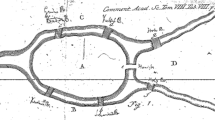Similar content being viewed by others
References
Barker, C., & Shan, C. (2008). Donkey anaphora is in-scope binding. Semantics and Pragmatics, 1, 1–42. doi:10.3765/sp.1.1.
Barwise, J., & Perry, J. (1983). Situations and attitudes. Cambridge: MIT.
Braun, D. (2006). Names and natural kind terms. In E. Lepore, & B. Smith (Eds.), The Oxford handbook of philosophy of language (pp. 490–515). Oxford: Oxford University Press.
Burge, T. (1973). Reference and proper names. The Journal of Philosophy, 70, 425–439.
Büring, D. (2004). Crossover situations. Natural Language Semantics, 12, 23–62.
Büring, D. (2005). Binding theory. Cambridge: Cambridge University Press.
Chalmers, D. (2006). Two-dimensional semantics. In E. Lepore, & B. Smith (Eds.), The Oxford handbook of philosophy of language (pp. 574–606). Oxford: Oxford University Press.
Chalmers, D. (2007). Propositions and attitude ascriptions: AFregean account. Ms., Australian National University. http://consc.net/papers/propositions.pdf.
Chomsky, N. (1981). Lectures on government and binding. Dordrecht: Foris.
Cooper, R. (1979). The interpretation of pronouns. In F. Heny, & H. Schnelle (Eds.), Syntax and semantics 10: Selections from the third Gröningen round table (pp. 61–92). New York: Academic.
Davies, M. (1981). Meaning, quantification, necessity. London: Routledge and Kegan Paul.
Edelberg, W. (1994). Propositions, circumstances, objects. Journal of Philosophical Logic, 23, 1–34.
Elbourne, P. (2001). E-type anaphora as NP-deletion. Natural Language Semantics, 9, 241–288.
Elbourne, P. (2005). Situations and individuals. Cambridge: MIT.
Elbourne, P. (2008). Demonstratives as individual concepts. Linguistics and Philosophy, 31, 409–466.
Evans, G. (1977). Pronouns, quantifiers and relative clauses (I). Canadian Journal of Philosophy, 7, 467–536.
Frege, G. (1892). Über Sinn und Bedeutung. Zeitschrift für Philosophie und Philosophische Kritik, 100, 25–50.
Geach, P. (1962). Reference and generality. Ithaca: Cornell University Press.
Geurts, B. (1997). Good news about the description theory of names. Journal of Semantics, 14, 319–348.
Groenendijk, J., & Stokhof, M. (1990). Dynamic Montague grammar. In L. Kálmán, & L. Pólos, Papers from the second symposium on logic and language (pp. 3–48). Budapest: Akadémiai Kiadó.
Groenendijk, J., & Stokhof, M. (1991). Dynamic predicate logic. Linguistics and Philosophy, 14, 39–100.
Heim, I. (1990). E-type pronouns and donkey anaphora. Linguistics and Philosophy, 13, 137–177.
Heim, I. (1998). Anaphora and semantic interpretation: A reinterpretation of Reinhart’s approach. In U. Sauerland, & O. Percus (Eds.), The interpretive tract. MIT working papers in linguistics (pp. 205–246). Cambridge: MIT.
Jacobson, P. (2000). Paycheck pronouns, Bach-Peters sentences, and variable-free semantics. Natural Language Semantics, 8, 77–155.
King, J. (2001). Complex demonstratives. A quantificational account. Cambridge: MIT.
King, J. (2003). Tense, modality and semantic value. Philosophical Perspectives, 17, 195–246.
Kripke, S. (1980). Naming and necessity. Cambridge: Harvard University Press.
Montague, R. (1969). On the nature of certain philosophical entities. The Monist, 53, 159–194.
Montague, R. (1973). The proper treatment of quantification in ordinary English. In J. Hintikka, J. Moravcsik, & P. Suppes (Eds.), Approaches to natural language: Proceedings of the 1970 Stanford workshop on grammar and semantics (pp. 221–242). Dordrecht: Reidel.
Neale, S. (1990). Descriptions. Cambridge: MIT.
Nunberg, G. (1993). Indexicality and deixis. Linguistics and Philosophy, 16, 1–43.
Nunberg, G. (2004). Descriptive indexicals and indexical descriptions. In M. Reimer, & A. Bezuidenhout (Eds.), Descriptions and beyond (pp. 261–279). Oxford: Clarendon.
Recanati, F. (1993). Direct reference. From language to thought. Oxford: Blackwell.
Recanati, F. (2005). Deixis and anaphora. In Z. G. Szabó (Ed.), Semantics versus pragmatics (pp. 286–316). Oxford: Clarendon.
Roberts, C. (2002). Demonstratives as definites. In K. van Deemterm, & R. Kibble (Eds.), Information sharing: Reference and presupposition in language generation and interpretation (pp. 89-136). Stanford: CSLI.
Russell, B. (1903). The principles of mathematics. Cambridge: Cambridge University Press.
Schiffer, S. (1992). Belief ascription. Journal of Philosophy, 89, 499–521.
Soames, S. (1987). Direct reference, propositional attitudes, and semantic content. Philosophical Topics, 15, 44–87.
Soames, S. (2002). Beyond rigidity. The unfinished semantic agenda of Naming and Necessity. Oxford: Oxford University Press.
Soames, S. (2005). Reference and description. The case against two-dimensionalism. Princeton: Princeton University Press.
Soames, S. (2008). Why propositions cannot be sets of truth-supporting circumstances. Journal of Philosophical Logic, 37, 267–276.
Stalnaker, R. (1976). Propositions. In A. F. MacKay, & D. D. Merrill (Eds.), Issues in the philosophy of language (pp. 79–91). New Haven: Yale University Press.
Stalnaker, R. (1978). Assertion. In P. Cole (Ed.), Syntax and semantics 9 (pp. 315–332). New York: Academic.
Stanley, J. (1997). Names and rigid designation. In B. Hale, & C. Wright (Eds.), A companion to the philosophy of language (pp. 555–585). Oxford: Blackwell.
van Eijck, J., & Kamp, H. (1997). Representing discourse in context. In J. van Benthem, & A. ter Meulen (Eds.), Handbook of logic and language (pp.179–237). Amsterdam: Elsevier and MIT.
Author information
Authors and Affiliations
Corresponding author
Rights and permissions
About this article
Cite this article
Elbourne, P. Why Propositions Might be Sets of Truth-supporting Circumstances. J Philos Logic 39, 101–111 (2010). https://doi.org/10.1007/s10992-009-9112-z
Received:
Accepted:
Published:
Issue Date:
DOI: https://doi.org/10.1007/s10992-009-9112-z




